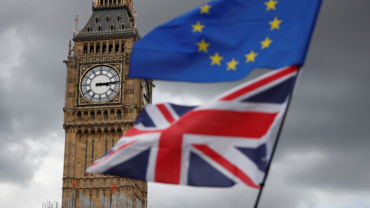Image Credit: REUTERS/Kai Pfaffenbach
For many, 2020 will be remembered as a year where everything was turned on its head. COVID-19 is, undeniably, the largest business disruptor many of us have experienced and dominated agendas for many in the legal and business world. Of course, even before COVID-19, significant changes were anticipated by many as Brexit reached its endgame.
With just days to go before the Brexit transition period came to an end, the United Kingdom (UK) and the European Union (EU) reached a deal on the future relationship agreements. However, while businesses may breathe a sigh of relief that Brexit is ‘done’—it is not yet complete. The future relationship agreements should be seen as a framework to build on in future negotiations as the UK-EU relationship develops further. All of which points to more change. As discussed in our recent Special Report, Getting ahead: Navigating legislative change post-Brexit, much of that change will come as the UK legislative and regulatory landscape diverges from that of the EU.
The European Union (Withdrawal Agreement) Act 2020 maintained considerable legal continuity after the UK’s withdrawal from the EU by enabling the UK to give effect to most EU law until the end of the Brexit transition period. With the UK outside the orbit of the EU, the European Union (Withdrawal) Act 2018 aims to avoid a legal cliff-edge by domesticating EU law, as far as possible, into a category known as ‘retained EU law’. However, much retained EU law requires amendment and there are more amendments to come.
Tracking legislative changes can be tricky at the best of times, and as UK legislation diverges from the EU’s, the task will become ever more complex, more time-consuming, and more challenging. As our report demonstrates, legislation divergence can often mean increased costs for businesses. A study by the Organization for Economic Development in Europe (OECD) and the International Federation of Accountants (IFAC) showed that legislation divergence was a moderate-to-substantial barrier to growth.
As the UK-EU relationship takes effect and details of divergence become known—the need for clear, accurate and up-to-date information will be imperative as lawyers provide guidance and advice on managing risks and optimising opportunities.
Wide-ranging impact
As our special report indicates, the UK-EU future relationship agreements will be a key part of the European business landscape for the foreseeable future and resulting regulatory and legislative divergence is already impacting businesses and law in several fundamental ways. Legal advisors will need a reliable, comprehensive, and efficient tool for legislative comparison allowing for prompt analysis and assessment of the impact of the changes. This would enable lawyers to assist their clients and organisations in formulating the appropriate legal and business strategy.
The OECD/IFAC study suggests that legal teams that can master this challenge will have the potential to deliver extraordinary value by helping their organisations and clients minimise costs and risks. The financial services companies responding to the survey incurred average costs equalling five to 10 percent of their annual turnover when “regulations are opaque, and information regarding requirements that are divergent across different jurisdictions is difficult to acquire”.
Given that the future relationship agreements are seen to be merely a foundation stone for further developments, which inevitably means more change, businesses will need practical advice on how best to navigate this dynamic space. As legislation diverges, compliance issues—and costs—are likely to increase. In the near term, businesses may struggle to know the best thing to do and so will need expert guidance based on a thorough understanding of the new legislative landscape. For businesses with operational footprints in the UK and the EU, the challenges will be significant.
Whether your business is directly affected by Brexit or not, change is likely to be on your horizon. In the UK and the EU, we are currently in a period in which external factors are demanding significant policy responses in ways we haven’t seen for decades. The economic damage caused by COVID-19 has been immense, and recovery is likely to be drawn out, difficult and have significant policy implications. COVID-19 has also accelerated digitalisation in many sectors, which will present future challenges and opportunities. Economic recovery may present countries with a chance to put sustainability near the top of their agenda to achieve carbon reduction targets. More specifically, in the UK, many in parliament have spoken about the need to rebalance the economy to address regional inequalities. These are generational policy issues that apply globally. Divergence, meaning change, complexity and uncertainty are all on the horizon.
Organisations will need to be proactive in the coming years and ensure they stay abreast of changes. In helping businesses meet this challenge, lawyers will need comprehensive answers quickly, and technology will be paramount.
Download your copy of ‘Getting ahead: Navigating legislative change post-Brexit’.



